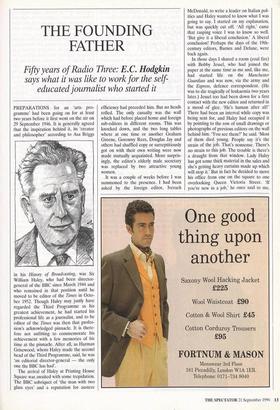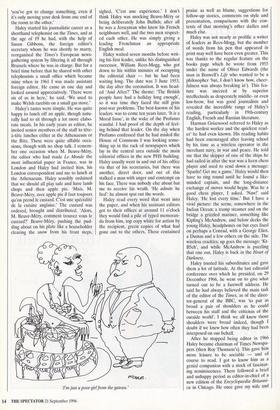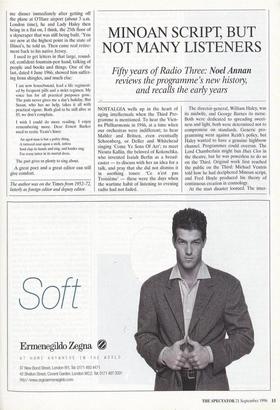THE FOUNDING FATHER
Fifty years of Radio Three: E.C. Hodgkin says what it was like to work for the self- educated journalist who started it
PREPARATIONS for an 'arts pro- gramme' had been going on for at least two years before it first went on the air on 29 September 1946. It is generally agreed that the inspiration behind it, its 'creator and philosopher' according to Ma Briggs
in his History of Broadcasting, was Sir William Haley, who had been director- general of the BBC since March 1944 and who remained in that position until he moved to be editor of the Times in Octo- ber 1952. Though Haley may justly have regarded the Third Programme as his greatest achievement, he had started his professional life as a journalist, and to be editor of the Times was then that profes- sion's acknowledged pinnacle. It is there- fore not unfitting to commemorate his achievement with a few memories of his time at the pinnacle. After all, as Harman Grisewood, whom Haley made the second head of the Third Programme, said, he was 'an editorial director-general — the only one the BBC has had'.
The arrival of Haley at Printing House Square was awaited with some trepidation. The BBC sobriquet of 'the man with two glass eyes' and a reputation for austere efficiency had preceded him. But no heads rolled. The only casualty was the wall which had before placed home and foreign sub-editors in different rooms. This was knocked down, and the two long tables where at one time or another Graham Greene, Goronwy Rees, Douglas Jay and others had shuffled copy or surreptitiously got on with their own writing were now made mutually acquainted. More surpris- ingly, the editor's elderly male secretary was replaced by two attractive young women.
It was a couple of weeks before I was summoned to the presence. I had been asked by the foreign editor, Iverach McDonald, to write a leader on Italian pol- itics and Haley wanted to know what I was going to say. I started on my explanation, but was quickly cut off. 'All right,' came that rasping voice I was to know so well. 'But give it a liberal conclusion.' A liberal conclusion! Perhaps the days of the 19th- century editors, Barnes and Delane, were back again.
In those days I shared a room (coal fire) with Bobby Jessel, who had joined the paper at the same time as me and, like me, had started life on the Manchester Guardian and was now, via the army and the Express, defence correspondent. (He was to die tragically of leukaemia two years later.) Jessel too had been down for a first contact with the new editor and returned in a mood of glee. 'He's human after all!' There had been an interval while copy was being sent for, and Haley had occupied it by pointing to the row of small drawings or photographs of previous editors on the wall behind him. 'You see them?' he said. 'Most of them died young. People say it's the strain of the job. That's nonsense. There's no strain to this job. The trouble is there's a draught from that window. Lady Haley has got some thick material in the sales and she's getting heavy curtains made up which will stop it.' But in fact he decided to move his office from one on the square to one overlooking Queen Victoria Street. 'If you're new in a job,' he once said to me,
`you've got to change something, even if it's only moving your desk from one end of the room to the other.'
Haley started his journalistic career as a shorthand telephonist on the Times, and at the age of 19 he had, with the help of Susan Gibbons, the foreign editor's secretary whom he was shortly to marry, reorganised the Times's European news- gathering system by filtering it all through Brussels where he was in charge. But for a brief time before that he shared with other telephonists a small office which became mine when in 1961 I was made assistant foreign editor. He came in one day and looked around appreciatively. 'There were six of us in here,' he said. 'We used to make Welsh rarebits on a small gas stove.'
Haley's tastes were simple. He was quite happy to lunch off an apple, though natu- rally had to sit through a lot more elabo- rate meals. In his early years as editor, he invited senior members of the staff to tete- a-tete lunches either at the Athenaeum or the Ritz. These were quite affable occa- sions, though with no shop talk. I remem- ber one occasion when M. Beuve-Mery, the editor who had made Le Monde the most influential paper in France, was in London and Haley had invited him, his London correspondent and me to lunch at the Athenaeum. Haley sensibly ordained that we should all play safe and have lamb chops and then apple pie. `Mais, M. Beuve-Mery, avec apple pie it faut toujours qu'on prend le custard. C'est une specialite de la cuisine anglaise.' The custard was ordered, brought and distributed. 'Alors, M. Beuve-Mery, comment trouvez vous le custard?' Beuve-Mery, pushing the pud- ding about on his plate like a householder clearing the snow from his front steps,
sighed, 'C'est une experience.' I don't think Haley was mocking Beuve-Mery or being deliberately John Bullish; after all he was a Jerseyman who knew his French neighbours well, and the two men respect- ed each other. He was simply giving a leading Frenchman an appropriate English meal.
Haley waited seven months before writ- ing his first leader, unlike his distinguished successor, William Rees-Mogg, who got down to his within minutes of occupying the editorial chair — but he had been waiting long. The date was 3 June 1953, the day after the coronation. It was head- ed 'And After?' The theme: 'The British people have had a holiday long enough', so it was time they faced the still grim post-war problems. The best-known of his leaders was to come ten years later, 'It is a Moral Issue', in the wake of the Profumo scandal. I had proof of the depth of feel- ing behind that leader. On the day when Profumo confessed that he had misled the House of Commons I was looking some- thing up in the rack of newspapers which lay in the central area outside the main editorial offices in the new PHS building. Haley usually went in and out of his office via that of his secretaries, but there was another, direct door, and out of this stalked a man with anger and contempt on his face. There was nobody else about but me to receive his wrath. 'He admits he lied': he almost spat out the words.
Haley read every word that went into the paper, and when his assistant editors got to their offices at around 11 o'clock they would find a pile of typed memoran- da from him, top copy white for action by the recipient, green copies of what had gone out to the others. These contained
'I'm just a poor girl from the gateau.'
praise as well as blame, suggestions for follow-up stories, comments on style and presentation, comparisons with the con- tents of that morning's other dailies and much else.
Haley was not nearly as prolific a writer of leaders as Rees-Mogg, but the number of words from his pen that appeared in print may well have been even greater. This was thanks to the regular feature on the books page which he wrote from 1955 under the name of Oliver Edwards (the man in Boswell's Life who wanted to be a philosopher 'but, I don't know how, cheer- fulness was always breaking in'). This fea- ture was sneered at by superior intellectuals as desperately middle- or even low-brow, but was good journalism and revealed the incredible range of Haley's reading, particularly in 19th-century English, French and Russian literature.
Harman Grisewood referred to Haley as 'the hardest worker and the quickest read- er' he had even known. His reading habits had been encouraged after leaving school by his time as a wireless operator in the merchant navy, in war and peace. He told me that the skipper of one of the ships he had sailed in after the war was a keen chess player and used to send down a message: 'Sparks! Get me a game.' Haley would then have to ring round until he found a like- minded captain, and the long-distance exchange of moves would begin. Was he a good chess player, I asked. `Naw!' said Haley. 'He lost every time.' But I have a vivid picture: the scene, somewhere in the Indian Ocean; a tramp steamer and on the bridge a grizzled mariner, something like Kipling's McAndrew, and below decks the young Haley, headphones on but eyes fixed on perhaps a Conrad, with a George Eliot, a Dumas and a few others on the side. The wireless crackles; up goes the message: 'Kt- B5ch', and while McAndrew is puzzling that one out, Haley is back in the Heart of Darkness.
Haley trusted his subordinates and gave them a lot of latitude. At the last editorial conference over which he presided, on 29 December 1966, he went on to give what turned out to be a farewell address. He said he had always believed the main task of the editor of the Times, as of the direc- tor-general of the BBC, was `to put as broad a pair of shoulders as he could between his staff and the criticism of the outside world'. I think we all knew those shoulders were broad indeed, though I doubt if we knew how often they had been interposed on our behalf. After he stopped being editor in 1966 Haley became chairman of Times Newspa- pers (then Roy Thomson's). This gave him more leisure to be sociable — and of course to read. I got to know him as a genial companion with a stock of fascinat- ing reminiscences. There followed a brief and unhappy period as editor-in-chief of a new edition of the Encyclopaedia Britannt- ca in Chicago. He once gave my wife and
me dinner immediately after getting off the plane at O'Hare airport (about 3 a.m. London time), he and Lady Haley then being in a flat on, I think, the 25th floor of a skyscraper that was still being built. 'You are now at the highest point in the state of Illinoi's, he told us. Then came real retire- ment back to his native Jersey.
I used to get letters in that large, round- ed, confident fountain-pen hand, talking of people and books and things. One of the last, dated 4 June 1966, showed him suffer- ing from shingles, and much else:
I am now housebound, lead a life regiment- ed by frequent pills and a strict regimen. My voice has for all practical purposes gone. The pain never gives me a day's holiday. But Susan, who has no help, takes it all with practical vigour. Both glad to be still alive at 85, we don't complain.
I wish I could do more reading. I enjoy remembering more. Dear Ernest Barker used to recite Yeats's lines:
An aged man is but a paltry thing, A tattered coat upon a stick, unless Soul clap its hands and sing, and louder sing For every tatter in its mortal dress.
The past gives us plenty to sing about.
A great poet and a great editor can still give comfort.
The author was on the Times from 1952-72, latterly as foreign editor and deputy editor.




















































































 Previous page
Previous page